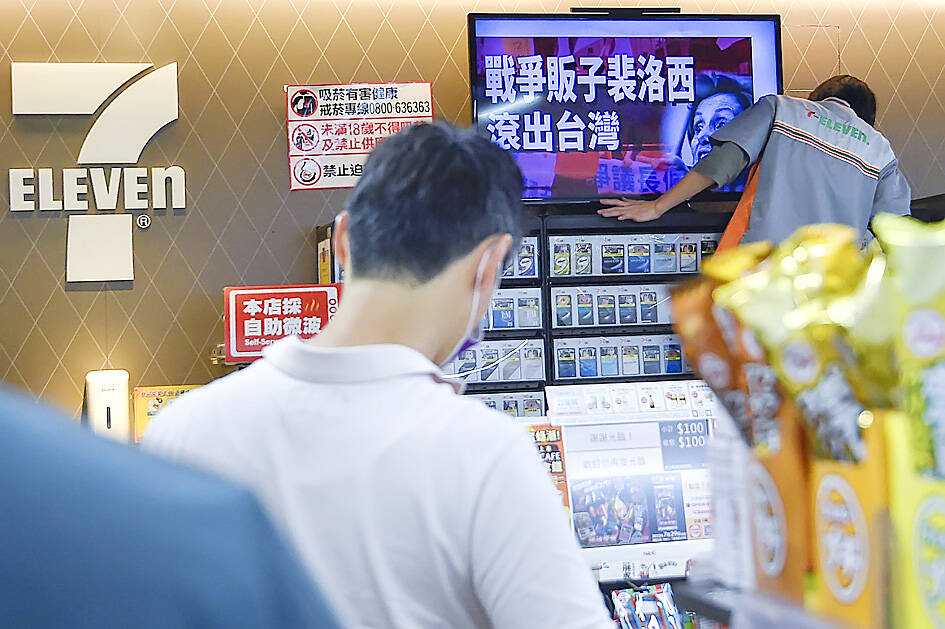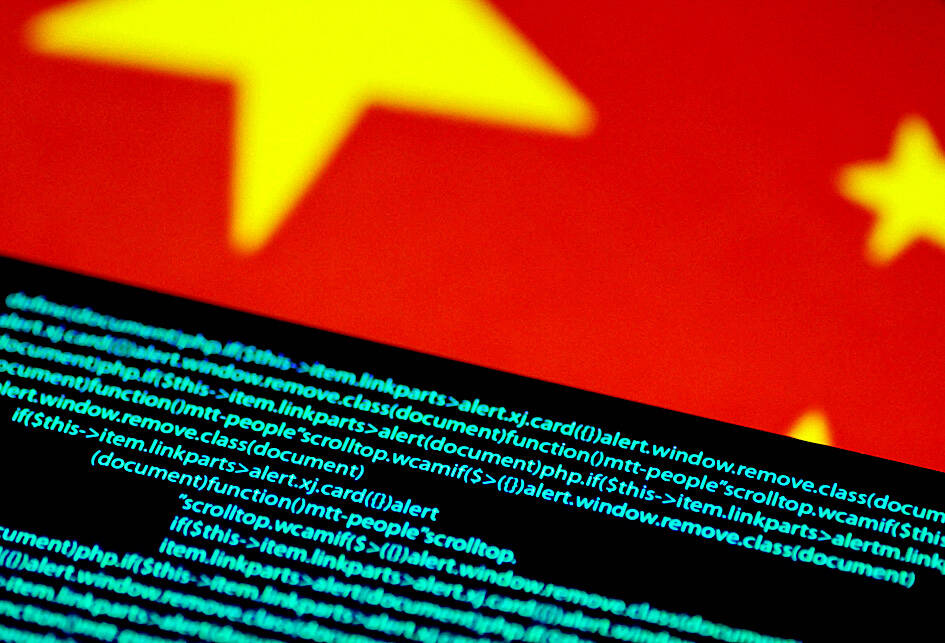The Executive Yuan is drafting regulations to tighten rules and protocols restricting the use of China-made telecom hardware and software by government agencies that could undermine national security, sources said.
For Taiwanese missions in countries where there is no alternative other than to use China-made products, the proposed measures would require that the agencies first pass two security checks — one by the government agency’s information security section head and a second by a higher level agency’s information security head, the sources said.
They would then have to file an application for approval by the Ministry of Digital Affairs, stating their reasons and conditions for using such products, with the information fed into a database on government special procurement programs for monitoring, the sources said.

Photo: Chen Chih-chu, Taipei Times
The additional safeguards are aimed at enhancing scrutiny to alert information security heads and patch vulnerabilities to prevent leaks and Chinese cyberattacks, they said.
During US House of Representatives Speaker Pelosi’s visit in early August, malicious messages against Pelosi were run on a southern Taiwan railway station’s digital billboard, which was rented to a contractor whose China-made operating software was hacked, prompting the Executive Yuan to undertake remedial action to patch the vulnerability.
The digital ministry, as the agency in charge of information security, has proposed stronger restrictions and enforcement of rules against the use of China-made telecom hardware and software by amending the “Principles on limiting the use by government agencies of products that harm national information security.”

Photo: Reuters
The proposed restrictions would include digital billboards and video displays rented to private contractors of Taiwanese railways and other state-affiliated enterprises and public sector agencies.
The ministry has posted a preview of the proposed amendments, now under review by the Executive Yuan’s Legal Affairs Committee, before the Executive Yuan is to officially issue an administrative order for their enforcement.
The main articles include an explicit ban against the use of China-made telecom products, including surveillance cameras, by government agencies and their contracted public-use sites, and would be incorporated into business agreement for companies renting the sites for use.
In related news, in response to allegations that a contractor from which Taiwan’s armed forces purchased bulletproof vests in 2018 might have used fabric from China instead of Taiwan, Tung Chung-hsing (董中興), deputy head of the Ministry of National Defense’s Department of Resource Planning, yesterday said that the armed forces had terminated the contract and handed the case over to the judiciary.
The armed forces are conducting checks on other contractors to see whether they have any links to China or Chinese funding, Tung said, adding that the fabric used in making bulletproof vests would be listed as one of the regulated military materials.
Additional reporting by Aaron Tu and Jason Pan

ENDEAVOR MANTA: The ship is programmed to automatically return to its designated home port and would self-destruct if seized by another party The Endeavor Manta, Taiwan’s first military-specification uncrewed surface vehicle (USV) tailor-made to operate in the Taiwan Strait in a bid to bolster the nation’s asymmetric combat capabilities made its first appearance at Kaohsiung’s Singda Harbor yesterday. Taking inspiration from Ukraine’s navy, which is using USVs to force Russia’s Black Sea fleet to take shelter within its own ports, CSBC Taiwan (台灣國際造船) established a research and development unit on USVs last year, CSBC chairman Huang Cheng-hung (黃正弘) said. With the exception of the satellite guidance system and the outboard motors — which were purchased from foreign companies that were not affiliated with Chinese-funded

PERMIT REVOKED: The influencer at a news conference said the National Immigration Agency was infringing on human rights and persecuting Chinese spouses Chinese influencer “Yaya in Taiwan” (亞亞在台灣) yesterday evening voluntarily left Taiwan, despite saying yesterday morning that she had “no intention” of leaving after her residence permit was revoked over her comments on Taiwan being “unified” with China by military force. The Ministry of the Interior yesterday had said that it could forcibly deport the influencer at midnight, but was considering taking a more flexible approach and beginning procedures this morning. The influencer, whose given name is Liu Zhenya (劉振亞), departed on a 8:45pm flight from Taipei International Airport (Songshan airport) to Fuzhou, China. Liu held a news conference at the airport at 7pm,

GRIDLOCK: The National Fire Agency’s Special Search and Rescue team is on standby to travel to the countries to help out with the rescue effort A powerful earthquake rocked Myanmar and neighboring Thailand yesterday, killing at least three people in Bangkok and burying dozens when a high-rise building under construction collapsed. Footage shared on social media from Myanmar’s second-largest city showed widespread destruction, raising fears that many were trapped under the rubble or killed. The magnitude 7.7 earthquake, with an epicenter near Mandalay in Myanmar, struck at midday and was followed by a strong magnitude 6.4 aftershock. The extent of death, injury and destruction — especially in Myanmar, which is embroiled in a civil war and where information is tightly controlled at the best of times —

Taiwan was ranked the fourth-safest country in the world with a score of 82.9, trailing only Andorra, the United Arab Emirates and Qatar in Numbeo’s Safety Index by Country report. Taiwan’s score improved by 0.1 points compared with last year’s mid-year report, which had Taiwan fourth with a score of 82.8. However, both scores were lower than in last year’s first review, when Taiwan scored 83.3, and are a long way from when Taiwan was named the second-safest country in the world in 2021, scoring 84.8. Taiwan ranked higher than Singapore in ninth with a score of 77.4 and Japan in 10th with